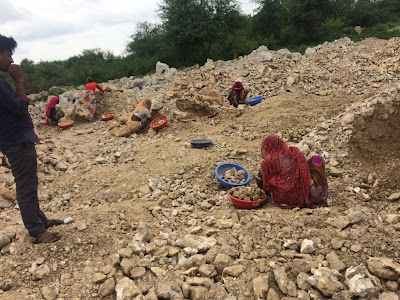In the ‘modern’ world, women have found most of the spaces where
they were perceived as inferior or weak/tender. But there are still several
sectors where women haven’t found space. Rajasthan is the biggest producer of
marble in which women have negligible participation in the productive activity
or as a labour. This post is an attempt to reflect upon the factors which are
hindering their entrance into this sector.
Patriarchy has always stopped women
to participate in social, economic and political activities. Patriarchy has
always denoted women as inferior and tender and it gets often legitimised by
various ‘sacred’ texts. On the other hand, Capital induced industrialisation
has always claimed to be an economic reformer in terms of providing equal
access to everyone devoid of identities and background. But the Indian context
is somehow very mixed. Participation of women in economic activities has
increased in the last three decades but the gendered ‘responsibility’ is still attached
to them. The Women Empowerment Index’ (WEI) of 2017 has shown a positive trend
in women empowerment of Rajasthan. It has clearly mentioned the increased women
participation in education, economic activities and decision making. But in the
case of mining, most of the things are stagnant.
From the field experience and after
interviewing dozens of mine workers, it becomes very symbolic that mines are
meant for the male. In this conception, women are perceived as biologically
weak who cannot do ‘heavy’ tasks. This includes multiple stereotypes like;
women can’t climb stairs in the deep mines, women can’t tackle heavy machines
like drill machines and wire shaw and women’s mind is not capable of doing
multiple things at the same time etc. Apart from it, they are considered to be
a supporting character to a family rather than a breadwinner. Such conceptions
not only make this space gendered but also helps to maintain the patriarchal
ideologies by declaring men as ‘superior’. In some cases, women are given space
for doing jobs but in those cases, they are provided jobs having less value
like breaking marble with the hammer. Such jobs are not considered valuable or
worthy therefore women are allowed to do work.
 |
| Picture credit: Neeraj Bunkar |
Generally, marbles mines are open in
nature and the workers have to work in harsh conditions. Although the working
condition in an open mine is better than the closed one but the scope of risk
is somehow equal. It is worthy to note that mines in Rajasthan have a very
serious health impact on workers and diseases like silicosis is common in
marble mines. Sometimes this space becomes very dangerous and may cost lives.
Promoting jobs in such sector can’t be ethically right but one should also look
upon gendered space of a large sector. Whatever the risks are they can’t be
absolutely cleared but there is always a scope for minimising it.
No comments:
Post a Comment